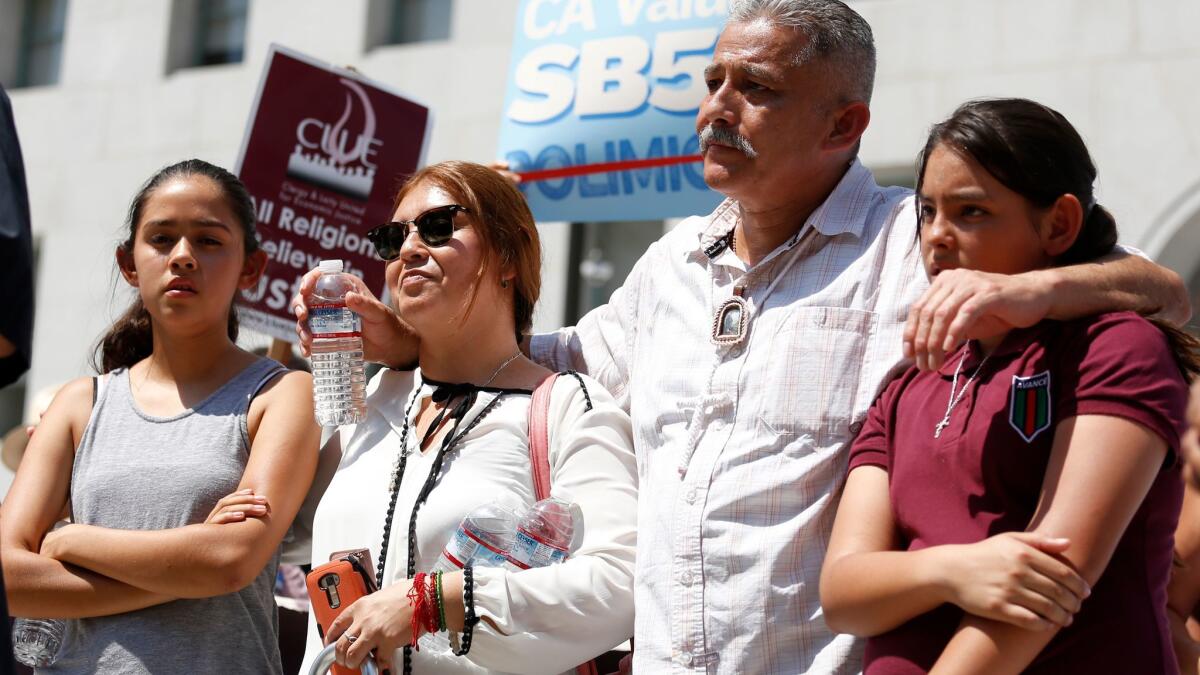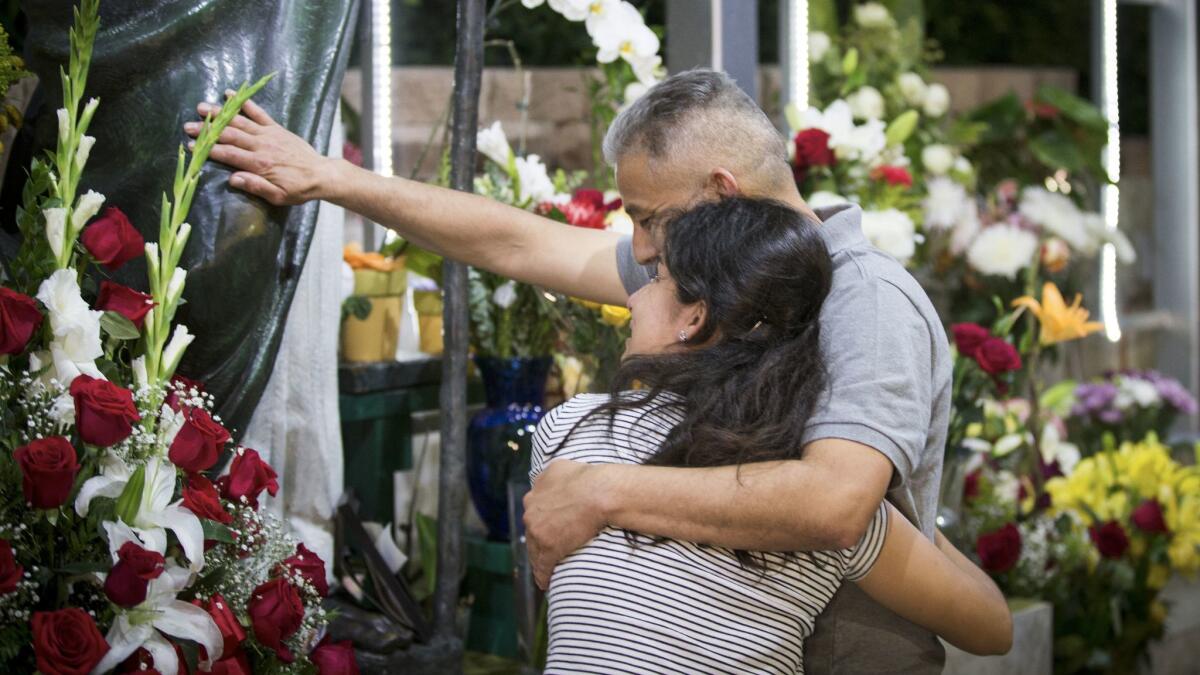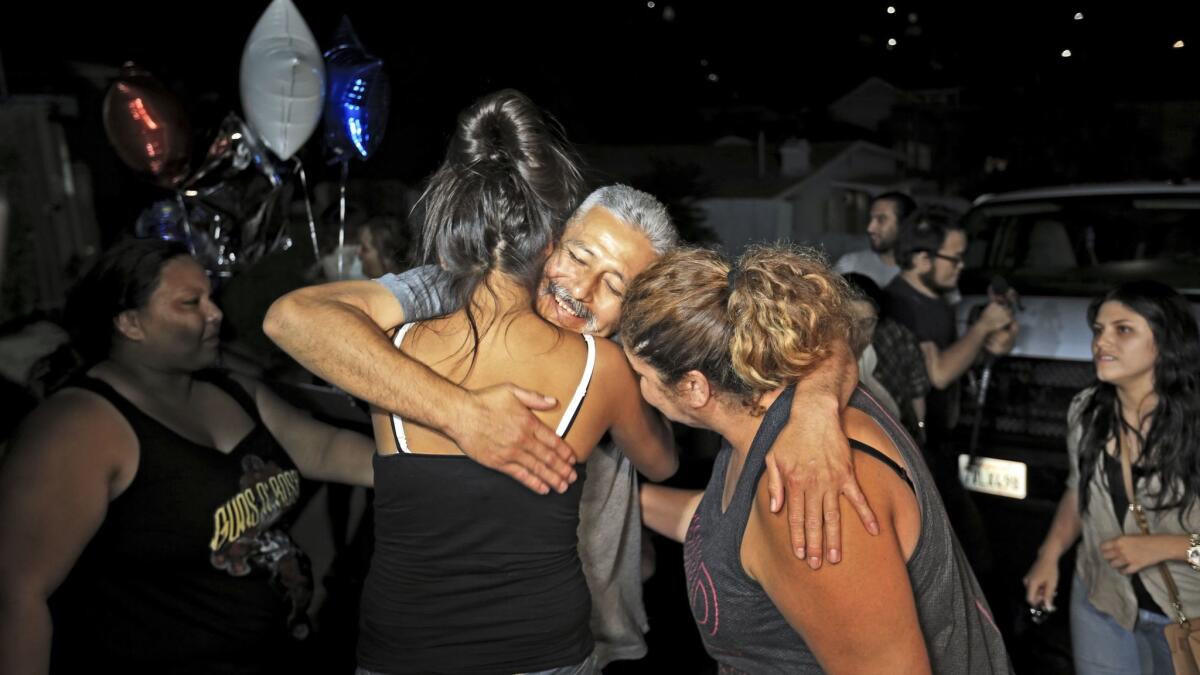After six months in immigrant detention, taquero whose arrest was videotaped walks out an advocate

Romulo Avelica Gonzalez was a taquero.
He worked at a modest Mexican restaurant near his home in the Los Angeles neighborhood of Lincoln Heights in the city’s Eastside.
Like most immigrants in the country illegally, Avelica Gonzalez kept his head down. He had his job making tacos, the love of his wife Norma and four daughters and not much else the outside world would probably care to know about.
Then he was arrested while taking his two youngest daughters to school. One of them recorded the encounter with her cellphone — and that would make all the difference.
Taken to an immigrant detention facility, he remained there for six months until he walked out, Wednesday night, to a battery of TV cameras.
The cook had become an activist. Or at least that’s what his lawyer called him.

Cellphone video of the arrest of Romulo Avelica-Gonzalez by immigration authorities taken by his 13-year-old daughter just after he had just dropped off his 12-year-old daughter at her school in Highland Park.
Avelica Gonzalez, 49, balks at the label, but not the burden.
“We have to do something to stop that — the separation of families,” he said Thursday to a supportive crowd. “Because it’s not just us who suffer in there. Our kids also suffer. They’re citizens.”
Avelica Gonzalez’s release comes during a week when President Trump is rumored to be considering ending an Obama-era policy that shields so-called Dreamers — immigrants brought illegally to the U.S. when they were young — from deportation, and after he pardoned former Arizona Sheriff Joe Arpaio, who was convicted of criminal contempt in connection to racial profiling of Latinos during his crusade against illegal immigration.
He joins an often rhetorically brutal debate over illegal immigration in which warring factions reach for symbols — whether it’s a deported mother or, in the case of Trump, U.S. citizen victims of crimes by those in the country illegally.
In late February, Avelica Gonzalez was detained by agents with U.S. Immigration and Customs Enforcement wearing jackets with the word “POLICE” on the back. His daughter Fatima, now 14, sobbed as she filmed the encounter. It went viral.
Lawyers settled Avelica-Gonzalez’s decades-old misdemeanor convictions — for driving under the influence and for receiving stolen car tags — that prompted the deportation order that led to his arrest. He pleaded guilty to lesser vehicle code violations, which would ordinarily not make him deportable.
An immigration appeals court threw out Avelica Gonzalez’s final deportation order last month. He is still in deportation proceedings but, because of massive backlogs, it could take years for his case to go back through the local immigration court process.
On Wednesday morning, an immigration judge ruled that he was eligible to post bond. That night he walked out of the Adelanto Detention Facility in San Bernardino County wearing the same green shirt and salsa-stained work pants he had on when he was arrested.
Driving back to L.A, the family first stopped at historic Mission San Conrado. Falling to their knees, they gave thanks to Jude the Apostle, the patron saint of desperate situations and lost causes.

He left detention with a list of more than 20 names and phone numbers of immigrants praying to get out just as he did — even if their ultimate fate, like his, remains murky.
“It’s easy to give up in there,” he said, pulling out and unfolding the list, handwritten on a scrap of paper, from his shirt pocket.
Avelica Gonzalez said that people he met while in detention inspired him to do more than go back to his old life.
Some were so poor they had no money even for a phone call, he said. A few got so depressed that they’d begin considering signing their deportation papers just so they could leave.
Some did, including one of his friends, a farmworker whose wife and children had lost their apartment without his income. The man had convictions for driving under the influence and illegal reentry, Avelica Gonzalez said. Desperate to work, he decided that going back to Mexico was better than waiting locked up in the U.S.
“Everything I lived through in there, my experiences and especially the stories of my friends — it’s really tough,” he said. “And even though my own heart was hurting, I tried to encourage them. I’d tell them, ‘You have to try, OK? Don’t give up.’”
On Thursday, Avelica Gonzalez kept that man and the others on his list in mind as he addressed reporters in front of the Los Angeles County Sheriff’s Department headquarters. He wore the braided white cross and the pendant with an image of his favorite patron saint that had been confiscated by guards as contraband immediately after The Times interviewed him last month.
He voiced his support for Senate Bill 54, which would block local and state law enforcement from using resources to help federal immigration agents, and announced that on Tuesday he will participate in a caravan to Sacramento to rally in support of the bill.
Commonly called the sanctuary state bill, it would limit the information that immigration agents receive about county jail inmates, including immigrants’ release dates, with the exception of those who have committed violent crimes. Sheriff Jim McDonnell has said the bill could hurt immigrants by forcing immigration agents to go deeper into communities to arrest people instead of going through the jail system. He said that could cause other immigrants to get caught up in the net.
Pablo Alvarado, executive director of the National Day Laborer Organizing Network, said Avelica Gonzalez fights not just for his family but for all families of immigrants facing deportation.

“The importance of this victory, of this case, is that Mr. Romulo told Trump and all our adversaries, ‘I don’t have fear,’” Alvarado said.
Standing before a large banner that read “#FREEROMULO,” Avelica Gonzalez took a pair of pruning shears and sliced the slogan in half. He and his daughter Fatima held up the part of the banner that now read: #FREE.
Still, Avelica Gonzalez said he doesn’t consider himself an activist, saying the word carries more responsibility and preparation than he has. But his experience gave him a platform, and he said he’ll use it to do what he can.
And despite the new attention, he doesn’t think it’ll be hard to settle back into his former life.
On his first night out of detention, as hunger gnawed at him, the man his lawyer declared an activist would have to wait for the taquero. It was nearing 10:30 p.m. when the family pulled up to the restaurant where he worked.
Reuniting with his boss at the grill, Avelica Gonzalez scooped meat onto tortillas, taking taco orders from everyone in line. Five asada. Two al pastor. That night, they were on the house.
Regular customers welcomed him with friendly slaps on the back. An in-house musician serenaded him on an acoustic guitar with a song about Nayarit, his home state in Mexico.
Finally, he took a seat next to his wife and said a quick prayer before digging into his tacos. He’d been dreaming of the moment for half a year.
ALSO
For Texas immigrants, Harvey came at an already tense time
Federal judge blocks implementation of controversial Texas law banning ‘sanctuary cities’
More to Read
Sign up for Essential California
The most important California stories and recommendations in your inbox every morning.
You may occasionally receive promotional content from the Los Angeles Times.











